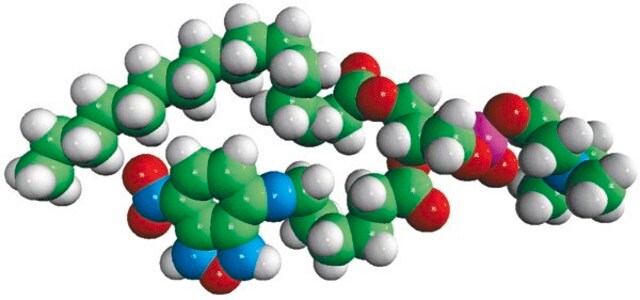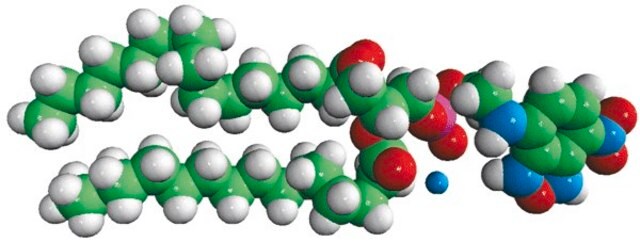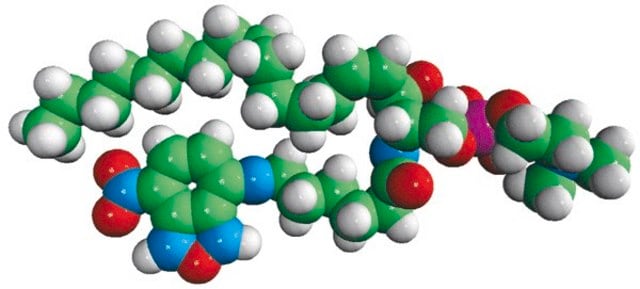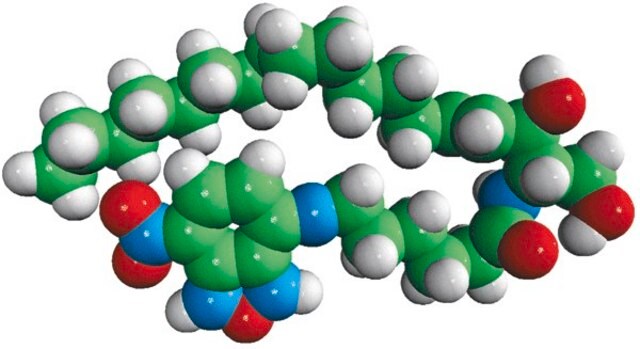810153P
Avanti
16:0-06:0 NBD PE
Avanti Research™ - A Croda Brand 810153P, powder
Synonym(s):
1-palmitoyl-2-{6-[(7-nitro-2-1,3-benzoxadiazol-4-yl)amino]hexanoyl}-sn-glycero-3-phosphoethanolamine
Sign Into View Organizational & Contract Pricing
All Photos(2)
About This Item
Empirical Formula (Hill Notation):
C33H56N5O11P
CAS Number:
Molecular Weight:
729.80
UNSPSC Code:
12352211
NACRES:
NA.25
Recommended Products
Assay
>99% (TLC)
form
powder
packaging
pkg of 1 × 1 mg (810153P-1mg)
pkg of 5 × 1 mg (810153P-5mg)
manufacturer/tradename
Avanti Research™ - A Croda Brand 810153P
shipped in
dry ice
storage temp.
−20°C
General description
N-(7-nitrobenz-2-oxa-1,3-diazol-4-yl) phosphoethanolamine (NBD PE) is a fluorescently labeled lipid localized at the membrane interface. The molecule contains NBD label covalently linked to the headgroup of phosphatidylethanolamine. PE is mostly present in the brain and is the second most abundant, metabolically related aminophospholipid.
Application
16:0-06:0 NBD PE is suitable for the determination of enzyme substrate specificity of lipoteichoic acid synthase (LtaS).
Biochem/physiol Actions
N-(7-nitrobenz-2-oxa-1,3-diazol-4-yl) phosphoethanolamine (NBD PE) is involved in screening the effects of Red edge excitation shift (REES) experiment with the unique motional and dielectric property it possesses. PE functions as a substrate for a number of phospholipids of the cell membrane.
Packaging
5 mL Amber Glass Screw Cap Vial (810153P-1mg)
5 mL Amber Glass Screw Cap Vial (810153P-5mg)
Legal Information
Avanti Research is a trademark of Avanti Polar Lipids, LLC
Storage Class Code
11 - Combustible Solids
Certificates of Analysis (COA)
Search for Certificates of Analysis (COA) by entering the products Lot/Batch Number. Lot and Batch Numbers can be found on a product’s label following the words ‘Lot’ or ‘Batch’.
Already Own This Product?
Find documentation for the products that you have recently purchased in the Document Library.
Application of NBD-labeled lipids in membrane and cell biology
Fluorescent methods to study biological membranes, 37-50 (2012)
Jean E Vance et al.
Biochimica et biophysica acta, 1831(3), 543-554 (2012-09-11)
Phosphatidylserine (PS) and phosphatidylethanolamine (PE) are metabolically related membrane aminophospholipids. In mammalian cells, PS is required for targeting and function of several intracellular signaling proteins. Moreover, PS is asymmetrically distributed in the plasma membrane. Although PS is highly enriched in
Maria Mercedes Palomino et al.
Microbiology (Reading, England), 159(Pt 11), 2416-2426 (2013-09-10)
The probiotic Gram-positive bacterium Lactobacillus casei BL23 is naturally confronted with salt-stress habitats. It has been previously reported that growth in high-salt medium, containing 0.8 M NaCl, leads to modifications in the cell envelope of this bacterium. In this study
Adilson Kleber Ferreira et al.
Biomedicine & pharmacotherapy = Biomedecine & pharmacotherapie, 67(6), 481-487 (2013-06-19)
Phosphoethanolamine (Pho-s) is a compound involved in phospholipid turnover, acting as a substrate for many phospholipids of the cell membranes. In a recent study, we showed that Pho-s has antitumor effect in the several tumor cells. In this study we
Mirka E Wörmann et al.
Molecular microbiology, 79(3), 566-583 (2011-01-25)
Lipoteichoic acid (LTA) is an important cell wall polymer in Gram-positive bacteria. The enzyme responsible for polyglycerolphosphate LTA synthesis is LtaS, first described in Staphylococcus aureus. Four LtaS orthologues, LtaS(BS) , YfnI, YqgS and YvgJ, are present in Bacillus subtilis.
Our team of scientists has experience in all areas of research including Life Science, Material Science, Chemical Synthesis, Chromatography, Analytical and many others.
Contact Technical Service






